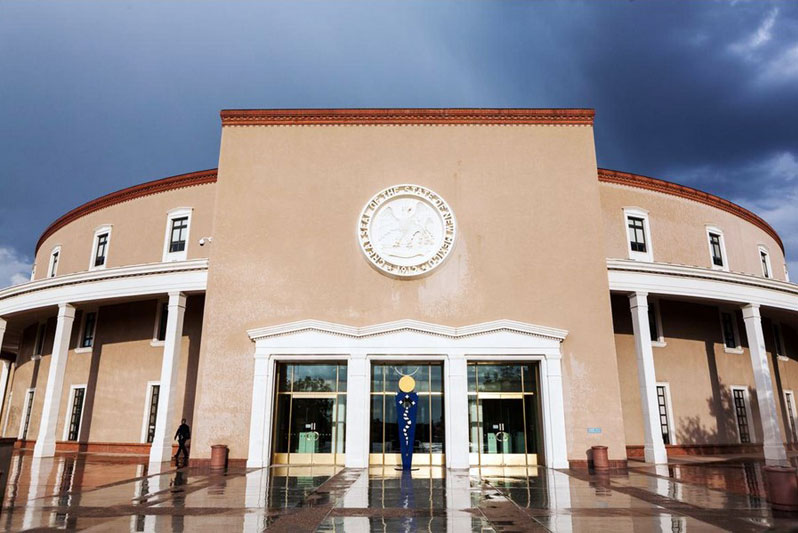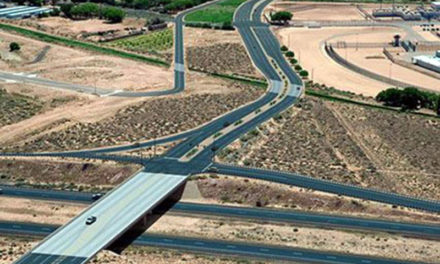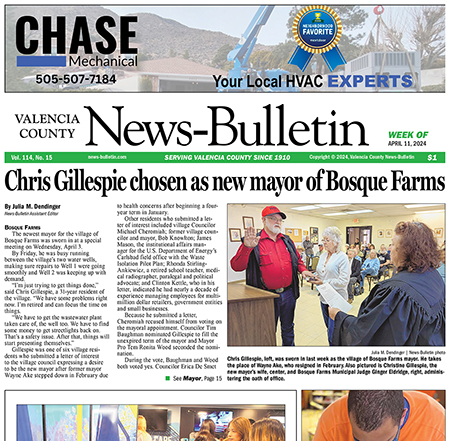The New Mexico Legislature’s 30-day session began Tuesday in Santa Fe, and will mostly focus on budgetary issues, although lawmakers will consider other legislation the governor has on her call list.
Budget and capital outlay
Gov. Michelle Lujan Grisham is proposing a $7.7 billion budget for the coming fiscal year, which is an 8.4 percent increase over current spending levels.
The state has historically relied on oil and gas revenues to pay for government programs, but many of the local legislators hope they can allocate the “excess” money on one-time, needed infrastructure projects.
Rep. Kelly Fajardo (R-District 7) says while the “new money” is great, and there are some good things in the governor’s proposed budget, such as raises for teachers, she’s concerned about what happens when the money isn’t there anymore.
“I’m concerned about the new raises in every department,” Fajardo said. “It should go to infrastructure projects — something to show for it.”

Rep. Kelly Fajardo
(R-District 7)
Fajardo says roads need to be fixed and broadband internet needs to be installed in rural areas of the state, including in Valencia County.
The Legislature allocated $50 million to the Los Lunas Interstate 25 interchange project last year, and village officials are awaiting word about additional funding from the federal government. Fajardo said she hopes it will be approved soon so the state won’t have to take the money back.
“We get a lot of requests for road projects, as well as quality-of-life issues, such as baseball and soccer fields and drainage projects,” Fajardo said. “There’s a big difference in what Albuquerque wants and what we need. Our money is needed for things like sewers.”
Rep. Alonzo Baldonado (R-District 8) says he has several different government entities looking for funding for various projects, such as money for upgrades for the Valencia Regional Emergency Communications Center.
He said the village of Bosque Farms is still needing funding for their waste water treatment plant, and the town of Peralta is working on its community center.
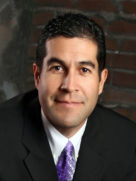
Rep. Alonzo Baldonado (R-District 8)
“The biggest thing we can do right now is make sure we have a seat at the table,” Baldonado said. “We’ve all done so good.”
Saying he and fellow legislators have been able to help with funding for the Los Lunas interchange project and the animal shelter’s spay and neuter program in the past, he hopes local infrastructure will benefit from this year’s budget.
Sen. Clemente Sanchez (D-District 30) said the two proposed budgets legislators will be looking at this session — the executive budget from the governor and the one developed by the Legislative Finance Committee — are fairly close in dollar amounts.
“Fortunately, we still do have a surplus, but it’s a little concerning that those surplus revenues have dropped under $180 million from August to December,” Sanchez said.
The state’s heavy reliance on severance taxes from oil and gas mean revenues are tied to companies’ decisions to focus on investor return rather than putting profits back into capital investments.
“There needs to be more drilling. A well loses 50 to 60 percent of its capacity in the first year,” he said. “Production is not as much and we need to be concerned with sustainability.”
During the session, Sanchez said the Legislature will be looking a big issues such as public employee pension reform, and he will be carrying a bill that changes the funding formula for public school districts.
“The bill would put more money to pay teachers who are in special ed and serving higher-risk students,” he said.
Another bill he hopes will end up on the governor’s call is a return to work bill for law enforcement officers.
“It would help reduce crime in areas like Valencia and Cibola counties, which see spill over from Albuquerque,” Sanchez said. “It would allow retired law enforcement officers to come back to work but they would have to be patrol officers, no desk jobs or administration. They would also have to pay into the pension plan, which would help shore that up.”
Sen. Greg Baca (R-District 29) said the state has almost $800 million in new revenues to work with this year. The governor’s budget proposes increasing spending by 8.4 percent, while the LFC budget contains a 6.4 percent increase.
“I think back to three years ago, when we had nothing, no money, we were sweeping funds, and this year is going to be a lot better year,” Baca said.
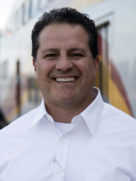
Sen. Greg Baca
(R-District 29)
He is hoping to put that extra revenue into capital projects around the state and Valencia County, as well as giving a boost to education.
“We don’t want to get into too many recurring debts, but rather to put that money into infrastructure that will last 30, 50 years,” he said.
In terms of local projects, Baca said there are always requests to fund road projects. One project he’d like to see funded is the town of Peralta’s community center. The town received funding to plan and design the center last year, and needs money to construct the building now.
“Around the beginning of February, we sit down with the other legislators and see if we can combine our funds for certain projects that are too big for us on our own,” he said. “Any time we see requests from multiple agencies, that gives us a really good indicator that it’s a needed project.”
Rep. Matthew McQueen (D-District 50) said he does his best to respect the districts’ priorities.
“I try to prioritize what the local communities prioritize. Rio Communities is my Valencia County area, so they’ll come to me and tell me what their priorities are and I just try to respect that,” McQueen said.
Because he has a large district, capital outlay dollars don’t go as far in a big geographic district as they do in a small district.
“There is always more demand than there is funding. I’ve heard we’re going to have less funding this year than we did last year,” McQueen said.
Rep. Harry Garcia (D-District 69) shared similar thoughts on the topic.
“I haven’t seen what they’re asking for yet, but you have to remember that I have a bigger district,” Garcia said. “A square mile gets the same outlay that I have and I have 400 miles. “I’ll look at what they’re asking for and see what I can do.”
Free college tuition
One budgetary issue the governor has proposed is free college tuition across the state, in the form of the New Mexico Opportunity Scholarship, a “last-dollar” program that would cover the cost of tuition and fees not paid for by federal grants or the New Mexico Lottery Scholarship.
Baldonado says his initial reaction to the proposal was New Mexico already has a “great system in place — the lottery scholarship.”
“At one time, the lottery scholarship was paying 100 percent of tuition, but now it’s at 60 or 70 percent, so it’s still paying tuition,” Baldonado says. “I’m afraid if you hand over everything for free, it might not be as valuable.”
Baldonado says while a good portion of New Mexico college graduates move out of state for higher paying jobs, he would hope economic development could be created in which jobs can be generated here.
“I’m just not a proponent of carte blanche of four years of college being paid for,” he said. “It’s sort of frustrating. We also need programs focusing on trade schools and other fields out there that are paying well. We need to get boots on the ground.”
Fajardo agrees with Baldonado that the state’s lottery scholarship is sufficient even though it might not meet everyone’s needs.
“If you don’t use it, you lose it,” Fajardo said of the lottery scholarship. “There’s more risk of losing it than keeping it if you don’t maintain a certain GPA. Why don’t fix what we have?”
Fajardo said the governor’s proposal of free tuition doesn’t address GPA requirements, and alternatives such as trade schools.
“I just don’t think this is wise,” Fajardo said. “It goes back to the oil and gas revenues, and what’s going to pay for this free college.”
While Fajardo is grateful for the economic boon, she says it might have “plateaued,” and the state can’t count on it forever.
“We need to have other opportunities for economic development,” she said. “Our county is being looked at for additional data centers and our state is a great opportunity for renewable energy.”
Details of the governor’s scholarship plan still need to be worked out, Sanchez said, who expressed concerns the funding might not benefit those who need it.

Sen. Clemente Sanchez
(D-District 30)
Students from low income families have the chance to apply for a Pell Grant, as well as receive the lottery scholarship to help with tuition, in addition to the opportunity scholarship.
Wealthier families wouldn’t qualify for Pell Grants but can receive the lottery funding and typically can pay for remaining tuition costs themselves.
“I’m concerned students in the middle class will be hurt,” he said. “This still needs some work.”
On Tuesday, Baca said he wasn’t sure what the “true price tag” of the Opportunity Scholarship program was.
“We have to be real careful with that. One of the things that troubles me is tuition costs are going up,” Baca said. “Back when we started, the lottery scholarship, it was funding tuition 100 percent and over the years, tuition has overrun what is available.”
Baca said now the state is attempting to supplement the original scholarship with a new one, and he isn’t sure where that would end.
“We’ll have to see what that looks like. There’s been a lot of back and forth about whether this is good or bad,” he said. “We’re not a wealthy state. It’s a good time now, but we’re kind of a one-show pony.”
When it comes to the proposed free tuition, McQueen said that is a much more complicated issue than it sounds.
“I certainly want to make college accessible to those who want to go, but we need to make sure we don’t do something that inadvertently impacts low-income students.”
McQueen attended a presentation recently on the topic and said there are some complications regarding the mix of funding available between state and federal funding.

Rep. Matthew McQueen
(D-District 50)
“We don’t want to do anything that impairs the students’ ability to get federal funding. This is something I’m supportive of but need to work through the details to make sure we get it right.”
Garcia said he was not opposed to the idea, but acknowledged some of the details need to be ironed out.
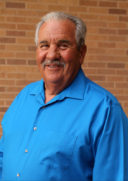
Rep. Harry Garcia (D-District 69)
“It’s a good idea, but there’s some issues that need to be addressed,” Garcia said. “It’ll benefit a lot of people but it will also benefit people who don’t need it. We need to know where the money is going to come from.”
The 2020 legislative session ends at 12 p.m., Thursday, Feb. 20.
(Editor’s note: Sen. Liz Stefanics (D-District 39) and Rep. Gail Armstrong (R-District 49) couldn’t be reached for comment before News-Bulletin deadline.
The News-Bulletin also asked legislators about two proposed bills, including the Red Flag law and legalizing recreational marijuana. This article will appear in next week’s newspaper.)
The Valencia County News-Bulletin is a locally owned and operated community newspaper, dedicated to serving Valencia County since 1910 through the highest journalistic and professional business standards. The VCNB is published weekly on Thursdays, including holidays both in print and online.
